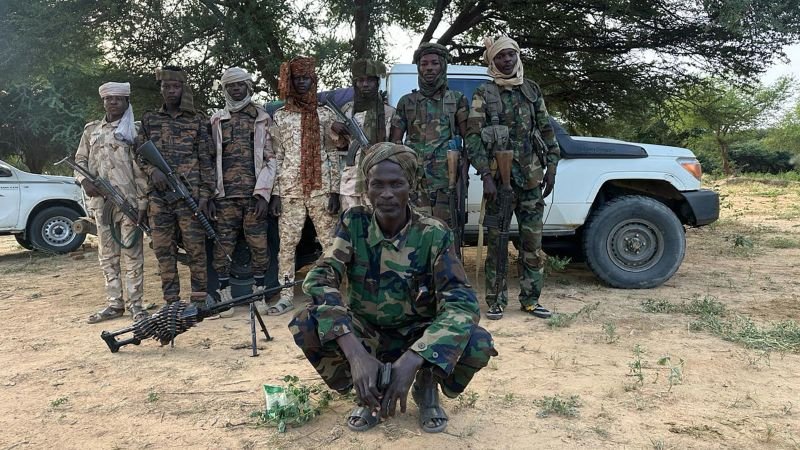North Darfur, Sudan CNN –
“No filming!” No photography! (“Don’t take a picture! Don’t take a picture!”) shouted the general, his eyes shining with anger, his jaw clenched as he turned toward us. Two fighters jumped out of the back of the militia’s main truck and walked around our car, rifles drawn.
The second truck that had been following us, dark-coloured and carrying a heavy machine gun, suddenly stopped alongside us and surrounded us.
There was a moment of panic – are they going to shoot us?
We came to Darfur to report on the world’s worst humanitarian crisis, and we did not intend to become part of the story.
But months of planning collapsed in moments when we were arrested by a militia led by the man everyone called the General.
Photographer Scott McWhinnie handed him the camera, assuring him: “We are not filming, we are not filming.” Producer Brent Swales quickly got out of our truck to try to defuse the situation.
“Are we okay? Are we okay?” he asked.
Suddenly, the general turned his back to us and snatched a rifle from one of his soldiers, before aiming it across the wooded savannah. I was relieved that the gun wasn’t pointed at us but I was still bothered by his erratic behavior.
I looked pleadingly at our driver. “What’s going on here?” His face was ashen. He said: “I don’t know.”
The general fired a round. It appears that the target was a bird. He missed it.
We had arrived in North Darfur the day before. The goal was to reach Tawila, a town under the control of the Sudan Liberation Movement-Abdul Wahid Faction, a faction of the Sudan Liberation Movement, led by Abdul Wahid al-Nur, a neutral party in Sudan’s bitter civil war. Tawila is located just 32 miles (51 kilometers) southwest of the besieged city of El Fasher, the front line in horrific fighting in the Darfur region. As a result, it has become a refuge for tens of thousands of people fleeing the city.
The 18-month-old conflict in Sudan has been largely overshadowed by the wars in Ukraine and Gaza, but the United Nations fears it is becoming far deadlier: a cruel confluence of hunger, displacement and disease with both the SAF and the SAF. The Rapid Support Forces (RSF), the two main warring parties in this conflict, are accused of war crimes.
According to the United Nations, more than 10 million people have been displaced by the violence, nearly a quarter of Sudan’s population. More than 26 million people – more than three times the population of New York City – face acute hunger.
In particular, all eyes are on Darfur, where genocide was committed from 2003 to 2005, and where brutal war crimes have exacerbated fears that the worst could happen again.
In August, famine was declared in Zamzam camp for displaced people in Darfur. However, only a few international journalists have been able to enter since the beginning of the war to cover what is happening.
After several months of failure to obtain permission to visit Darfur from the Sudanese Armed Forces or the Rapid Support Forces, an invitation from the SLM-AW leadership to visit Tawila seemed the safest way to enter and tell the story.
But when we arrived at the agreed meeting place in the town of Abu Qamra, our hosts were nowhere to be found. Instead, a rival militia stood in their place. They had two Toyota Land Cruiser pickup trucks, loaded with rocket-propelled grenades and heavy machine guns.
Our driver was taken in chains to the city jail.
We were interrogated for three hours, one by one, in a small, windowless room. About eight men asked questions. “Why are you here?” “Who sent you here?” “Who allowed you to be here?”
We answered their questions, but we did not get any information in return: who are these men or what do they want from us?
When the driver later returned without the chains, there was a brief moment of optimism. We may be escorted to the border and simply told not to return.
But the gunmen put us in our car and ordered us to follow them.
Our convoy quickly deviated from a dirt road, heading deep into Darfur.
At that moment, the general suddenly stopped his car and started shouting at us, before firing his gun. The goal, most likely, is to scare us. You succeeded.
We stopped again, perhaps an hour later, at a dry, tree-lined riverbed. The youngest fighters laid out a mat and brought out a vial of camel milk for the general and another senior man known as the head of security, who was wearing a turban and sunglasses to hide a missing eye. I shakily took off my shoes and sat down in front of them.
“Please, we are so afraid,” I told them in halting Arabic. “I’m a mother. I have three little boys.”
The general seemed unconcerned, but I saw the security chief’s face soften.
He assured me: “Do not be afraid, do not be afraid, we are human beings.”
We asked the head of security for our partners’ phone numbers, so he could call them and assure them we were fine. Reluctantly, I handed him my husband’s number – reluctant to put my family under any pressure but aware that it might also be a way for the kidnappers to verify my story. Later, we discovered that an English speaker had called my husband and Scott’s wife from Port Sudan, thousands of miles away from where we were being held, to tell us we were safe and well but threatened that we would be killed. Imprisonment for many years if they talk about it to anyone.
For the next 48 hours, we were held under armed guard by the general, the head of security, and approximately a dozen soldiers, some of whom appeared to be no more than 14 years old. We spent our detention in the open, under acacia trees. As a single woman, and without a private space to relieve myself, I limit my water and food intake. Sleep, when it did come, was a mercy, a break from the panic of not knowing when I would be able to see my kids again.
As a journalist, one never wants to become the story. However, our experience is useful in understanding the complexities of the conflict in Darfur and the challenges of getting food and aid to those who need it most and spreading the story to the world.
During our journey in and out of North Darfur, we spent many hours crossing the remote region on sandy tracks. We had to dig ourselves out over 10 times and had a flat tire at least once a day. There are no paved roads in the area, making aid distribution more difficult.
But while sturdy trucks with the right tires may help speed up the process, access to the area is a much trickier problem to solve. North Darfur state is the center of some of the fiercest fighting between the Rapid Support Forces and the Sudanese Armed Forces. Large swaths of it are under the control of a patchwork of different militias with competing agendas that regularly switch allegiances. You can get a safe pass guarantee on one of these roads, but you will be blocked another 10 miles down the road.
In August, during US-led talks on Sudan in Geneva, the Sudanese Armed Forces agreed to allow aid to flow through Adre, the largest border point between Chad and Darfur. But fewer than 200 trucks have entered in the past two months – a small fraction of what is needed on the ground – and only a few of those trucks have reached the famine-stricken Zamzam camp outside El Fasher, where nearly half a million people are struggling. In order to survive.
Earlier this month, MSF announced that it had to suspend its operations in Zamzam.
“This is a disaster for us. Knowing that we have a team capable of working on the ground and that this suspension is due to either administrative impediments or obstruction by the warring parties is of course frustrating. Michel Lacharité, head of emergency operations at MSF, told me.” “We keep trying to push… We can’t abandon these people.”
Compounding the chaos is the difficulty of communications. During our time in North Darfur, we passed at least six cell phone towers but none of them were working. The hierarchical order of any group is clearly determined by who carries the satellite phone. Our captors confiscated our satellite phone, but let us keep our cell phones, confident they would never work. And they didn’t. Some groups have Starlink satellites that they use to stay in touch. But for most ordinary people, there are few ways to contact the outside world.
The end result of these multiple challenges is that NGOs, human rights organizations and journalists have almost no access to North Darfur.
“The world doesn’t see us, and help isn’t coming,” the security chief told me one afternoon.
Instead, the most valuable and reliable data we have about the situation on the ground in Darfur comes from satellites.
According to the Yale Humanitarian Research Laboratory, which uses satellite images to create a picture of the situation on the ground, in the first two weeks of October, Rapid Support Forces set fire to at least 14 villages in Darfur, raising fears that after a relative was killed and with the calm During the rainy season, the conflict escalates again.
But satellite images can only tell part of the story. They don’t allow us to connect, empathize, and share.
On our last day in detention, the general and the security chief disappeared for about six hours, leaving us in the custody of their young fighters. At one point, several of them asked us to remove our bags from our car, saying they would take our driver to the local market. The four of us looked at each other worriedly. Were they planning to abandon us? Or do they hand us over to another group? We had no choice but to do as we were told and unload our gear.
Later, when the general and security chief returned, their spirits were good.
They told us: “You have been scheduled to be released tomorrow.” “We thought you were spies but now you can go home.”
A wave of relief crashed through my body. There were smiles and handshakes with our captors. We posed awkwardly for a photo on the edge of the mat that served as our makeshift prison.
Our ordeal is over. We were unharmed and will be home soon. Fear and anxiety were quickly replaced by a feeling of bitter disappointment and failure. We never got to the long one. I have never been able to speak to the people in Darfur whose lives have been consumed by this brutal civil war. Untold stories that the world may never hear.
CNN affects your world
If you would like to help Sudanese refugees through charities that provide assistance, go to the form below or click here. Learn more ways to help communities at Impact Your World.











